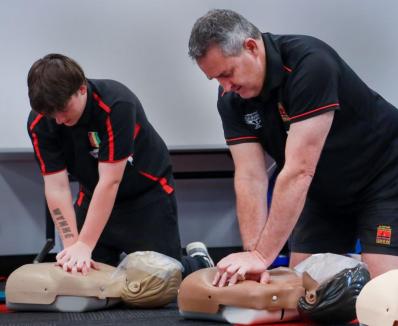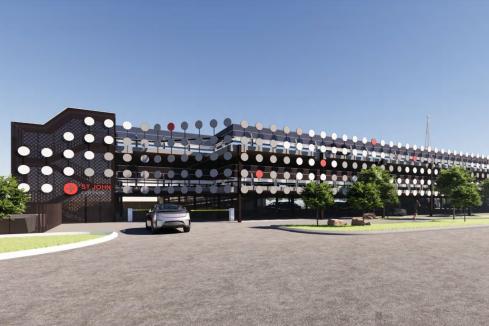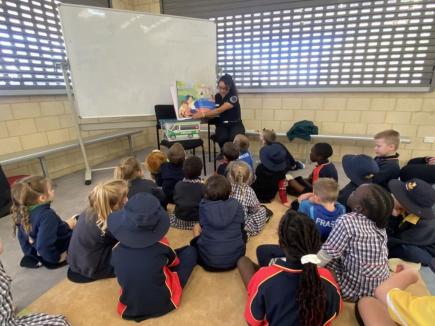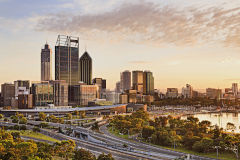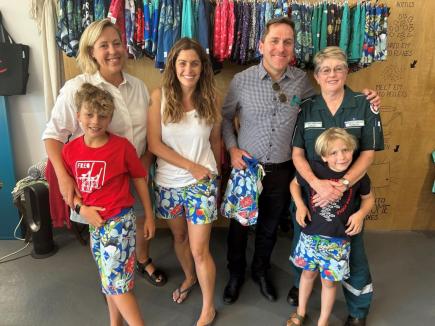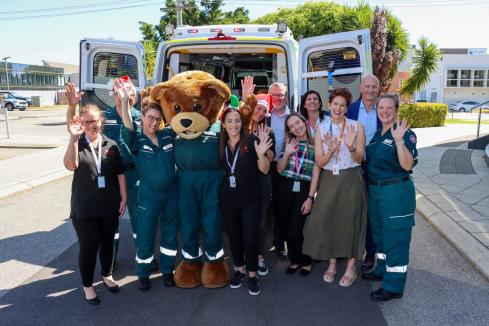
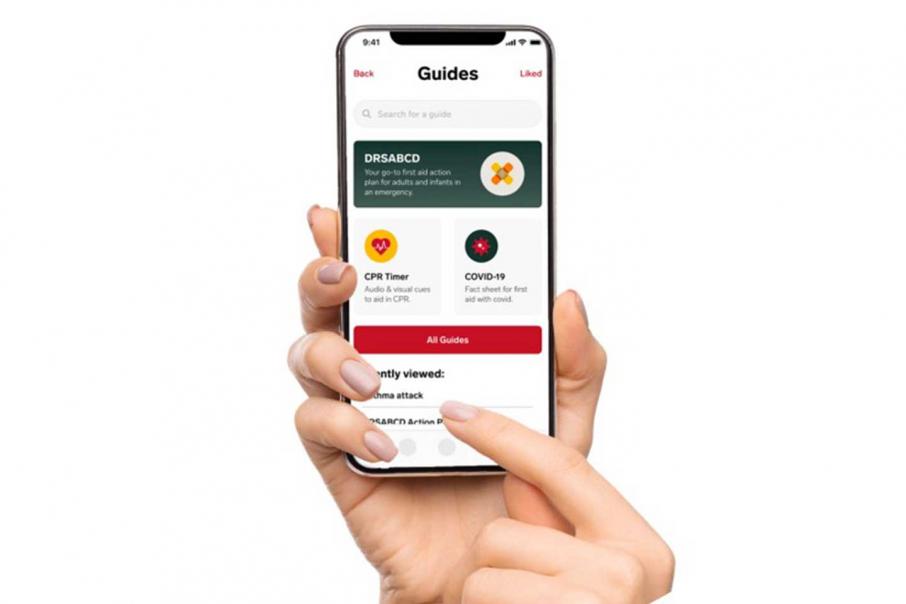
Not For Profits like St John WA were established for all Western Australians – not just those in the Perth metropolitan region. However, as logistical costs and other challenges continue to create headaches for those directing projects from the CBD, the focus remains the same: to offer medical assistance to all who may need it, regardless of their postcode.
A State-wide safety net
St John WA operates Triple Zero (000) response across the biggest ambulance jurisdiction in the world.
That's why, says Angelina Robins, Major Partnerships Specialist for St John WA, we have the Community First Responder Network and the St John First Responder to connect our community to respond to emergencies.
“We want to encourage anyone who has installed a defib to register the life-saving device and make it accessible to the public.
“When we discuss delivery and logistically trying to be there for every emergency, the way we do this is by ensuring the community is trained and have access to a defibrillator when someone suffers from a cardiac arrest.”
In December 2022, St John WA delivered its 7000th Automated External Defibrillator (AED) to the Western Australian community with the addition of the life saving device to an Alkimos beachfront restaurant.
Oceans 27 registered its AED on the St John Community First Responder Network this month, making it among 1000 defibrillators registered so far this year at local businesses, community organisations and sporting clubs across the state.
Increasing community access to defibrillators can literally mean the difference between life and death, with survival rates for people suffering cardiac arrest increasing significantly if first responders have access to an AED.
Established in 2011, the St John WA Community First Responder program is a free service that aims to get defibrillators to cardiac arrest victims in the vital minutes before an ambulance arrives. Locations of all registered AEDs are listed on the St John First Responder app.
Some 79% of cardiac arrest patients receive CPR by a bystander confirming why learning how to perform CPR and using an AED is vital in improving cardiac arrest survival rates before paramedics arrive.
Which is why an individual plays an important role in the chain of survival by administering help before the ambulance arrives.
Studies show nine out of 10 people won’t survive an out-of-hospital cardiac arrest. The First Responder program aims to improve this statistic by increasing access to AEDs in the community, with survival rates improving by 70 per cent when a defib is applied within three minutes.
St John WA Executive Director Aaron Crowther said it was testament to the strength of the WA community that so many organisations and businesses were prepared to have an AED located at their premises, ensuring easy access in case of emergencies.
“Providing our community with greater access to defibrillators is a key goal and one that’s close to our hearts at St John,” Mr Crowther said.
“Reaching the 7000th defibrillator is an incredible milestone and it’s magnified knowing that through the Community First Responder program we have made the community stronger. The more organisations that register – the more lives we’ll save.”
Corporates step up to re-start hearts in remote regions
CBH Group has donated $20,000 towards the purchase of St John WA defibrillators across regional WA. This figure marks a new milestone for the partnership, with CBH Group donating more than $195,000 since the commencement of the partnership almost 10 years ago.
The latest donation has resulted in the purchase of 19 new defibrillators, set to be installed across grain growing regions to support St John WA’s Community First Responder Program (CFR).
To date, 116 St John WA defibrillators have been installed across regional WA communities thanks to CBH Group, including 25 in the Goldfields/Esperance region, 27 in the Great Southern, 26 in the Midwest, 37 in the Wheatbelt and one in the Northwest.
Since the commencement of the partnership in 2012, CBH Group has provided funds and lifesaving equipment to regions including the Goldfields, Esperance, Great Southern, Midwest, Northwest and Wheatbelt through the reinvestment of profits from excess grain as part of their Harvest Mass Management Scheme (HMMS).
The CFR Program is a St John WA initiative that enables community members to provide help in the crucial minutes before an ambulance arrives. This program is now operating in more than 5800 locations across Western Australia which continues to grow.
CFR Program Manager Sally Simmonds said publicly accessible defibrillators provided victims of sudden cardiac arrest with a better chance of survival.
“St John WA covers the largest area of any single ambulance service in the world – 2,525,500 square kilometres or 33 per cent of the total landmass of Australia.
“Our team of country volunteers travel more than two million kilometres across country WA annually, transporting more than 64,000 people,” Ms Simmonds said.
“Through partnerships with organisations like CBH Group, we’re able to empower people in regional communities to potentially save someone’s life in the event of a sudden cardiac arrest. With 116 defibrillators available across regional WA, CBH is helping to build a more resilient community.”
Partnering with Indigenous organisations keeps remote communities healthy
In addition to CBH’s incredible generosity in farming communities, John WA has partnered with four community organisations, Wirrpanda Foundation, Clontarf and the Moorditj Koort and Yinhawangka Aboriginal Corporations, to support regional Aboriginal and Torres Strait Islander communities through the donation of 14 defibrillators.
The defibrillators have been supplied by St John to each organisation to activate across 14 towns in the Goldfields-Esperance, Avon, and Midwest regions.
Laverton, Northam, Wiluna, Northam, Geraldton, and Kalgoorlie are among the 14 towns that have received defibrillators and will form part of St John’s wider Community First Responder network once installed. The towns chosen by St John to receive the defibrillators after being identified as remote and vulnerable.
The support has been enabled via the organisation’s fundraising arm, St John Giving, representing the organisation’s commitment to building stronger, more resilient communities.
“St John is proud to strengthen the healthcare infrastructure of communities across WA, particularly within first nation communities. Through these partnerships we are actively and authentically closing the resilience gap,” said Mr Crowther.
“Our Community First Responder program has over 2530 locations across regional WA, with these 14 new defibrillators adding to our network in remote communities.”
Clontarf General Manager — Employment, Marcus Harrold said the donation will play an important role in supporting Aboriginal and Torres Strait Islander peoples.
“Every West Australian has a right to receive support in their time of need. Through providing these defibrillators St John WA is bridging the gap in supporting indigenous communities with access to vital healthcare services,” said Harrold.
Wirrpanda Foundation General Manager of Community Development Troy Cook said the organisation is pleased to work with St John in broadening its first responder network.
“Through St John’s commitment to donating defibrillators to our regional communities, we’re able to have peace of mind that a well-coordinated response plan to medical emergencies is in place for our vulnerable and remote communities,” said Mr. Cook.
Solutions lie in the partnerships with corporates operating in these regions such as the resources industry, and it with their input, to help us by making all AEDs publically accessible and registering it to our first responder network.
Learn more about our Community First Responder Program here and if you’d like help install a new life-saving defibrillator in the region you’re in, feel free to contact Angel Robins on Angelina.robins@stjohnwa.com.au





